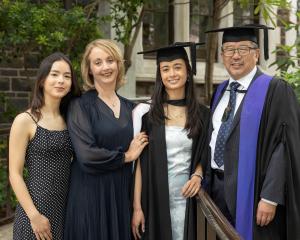
As at the end of March, Pacific Edge had $14.6million cash in hand, but the monthly cash burn was estimated by analysts to be about $1.5million; with 2016-17's monthly burn running at $1.75million.
So far this year that cash burn has risen to $1.8million per month, but over the entire year was expected to average out to $1.6 million.
Pacific Edge shares plunged almost 20% on the news, shedding 7.5c to trade down to 36.5c.
Fourteen-year-old Pacific Edge is yet to post a maiden profit and has to date burnt though more than $97 million in accumulated losses, but reiterated yesterday it expected to break even in full-year 2019.
Pacific Edge chief executive David Darling was unable to return calls for an interview yesterday. In the offer statement, Mr Darling said the $21.3 million being sought would be sufficient to fund operations until it achieved cash flow break even in 2019, the proceeds to be targeted for US growth.
For the first time, the company yesterday estimated that in the 2019 full year it would be providing about 23,100 tests, gleaning $27.9 million in revenue, leaving a positive $3.5 million cash flow.
Shareholders at its annual meeting in Dunedin in August were strident in seeking answers to Pacific Edge's projected cashflows and expected timeframe for breaking even.
There was no indication of further capital being sought at the annual meeting.
Yesterday, Mr Darling said the US was the company's ``primary market opportunity''.
``It is the world's largest healthcare market and offers in excess of 3 million test opportunities per annum across the clinical pathways covered by Cx-bladder,'' he said.
He said Pacific Edge had made ``significant progress'' with validation of performance and the clinical utility of its Cx-bladder products.
It had contracts in place with two of the four large-scale organisations it was targeting, and good progress was being made with the remaining two, all of which had the potential to be ``transformational'' for Pacific Edge, Mr Darling said.
Mr Darling said several times in 2016 the company was not intending going back to shareholders for more capital.
However, after $8.75 million was successfully sought in February this year, he said at the time that was expected to cover operations through to 2018.
Yesterday, Mr Darling said depending on decision-making by the large US health organisations, the company anticipated reaching cashflow break even for the year ending March 2019.
Pacific Edge booked a $21million record loss for its last financial year, which followed a $15.4million loss the previous year.
Pacific Edge has established a beachhead and laboratory in the crucial US market, gained regulatory approvals and has clinched several contracts with large health organisations; representing tens of millions of potential patients.
However, its future lies in the hands of 11,700 US urologists who must order its mainstay non-invasive Cx-bladder test programme, instead of the conventional, more expensive and invasive tests.
Pacific Edge is offering shareholders one new share for every six they own at 32c each, a 26.6% discount to Tuesday's 44c price; with the offer of 66.6 million shares fully underwritten by First NZ Capital Securities.
Craigs Investments Partners broker Peter McIntyre predicted six months ago Pacific Edge had enough cash on hand to trade for about six months.
Yesterday, Mr McIntyre said it ``came as no surprise'', Pacific Edge had to again go to shareholders, noting some ``earlier stage'' shareholders would be ``suffering capital raising fatigue''.
Forsyth Barr broker Lyn Howe said the cash injection was necessary and investors continued to require patience with Pacific Edge
``The company's cash balance was running very tight.
``The capital raising removes the near-term uncertainty around its balance sheet and provides flexibility, albeit it would have been nice to come alongside a US milestone announcement, like signing a commercial contract with [health care insurer and provider] Kaiser Permanente,'' she said.
While noting the first time guidance from Pacific Edge, Mrs Howe said it ``remained difficult'' to pinpoint when the large US customers would come on board, making assessment of the guidance also ``difficult''.
``Forecast test numbers are below our expectations, but the implied revenue per test is materially higher,'' she said.
Mr McIntyre said during the past 14 years Pacific Edge had used the ``whole gamut'' of capital raising, ranging from numerous private placements, rights issues and share purchase plans to raise cash.
The ``good news'' on the latest share offer was that it was fully underwritten by First NZ Capital Securities, meaning the company would ultimately get the $21.3million, he said.
``It is a very capital intensive business and costly to get established in the US market,'' he said.
He noted that with the share price plunge yesterday, the discount to the 44c share price on Tuesday had narrowed from 26% down to less than 18%, given the actual price had declined to 36.5c yesterday.
On the question of ``shareholder fatigue'', Mr McIntyre said if shareholders opted not to participate, they would see the value of their shares further diluted, given 66.6 million were being issued.
``[However] from 2019, the ramp-up from there will really excite the market,'' Mr McIntyre said.













